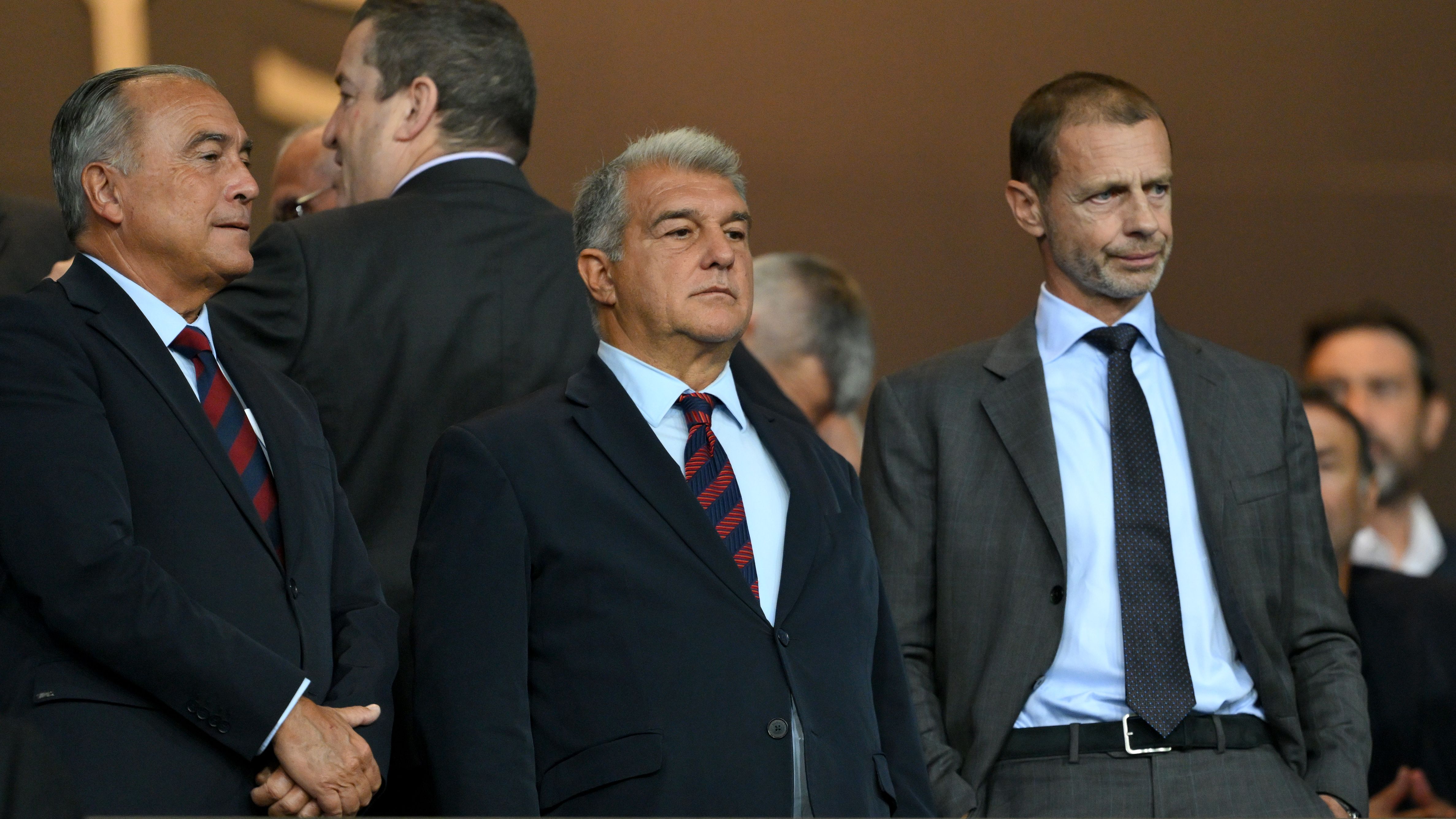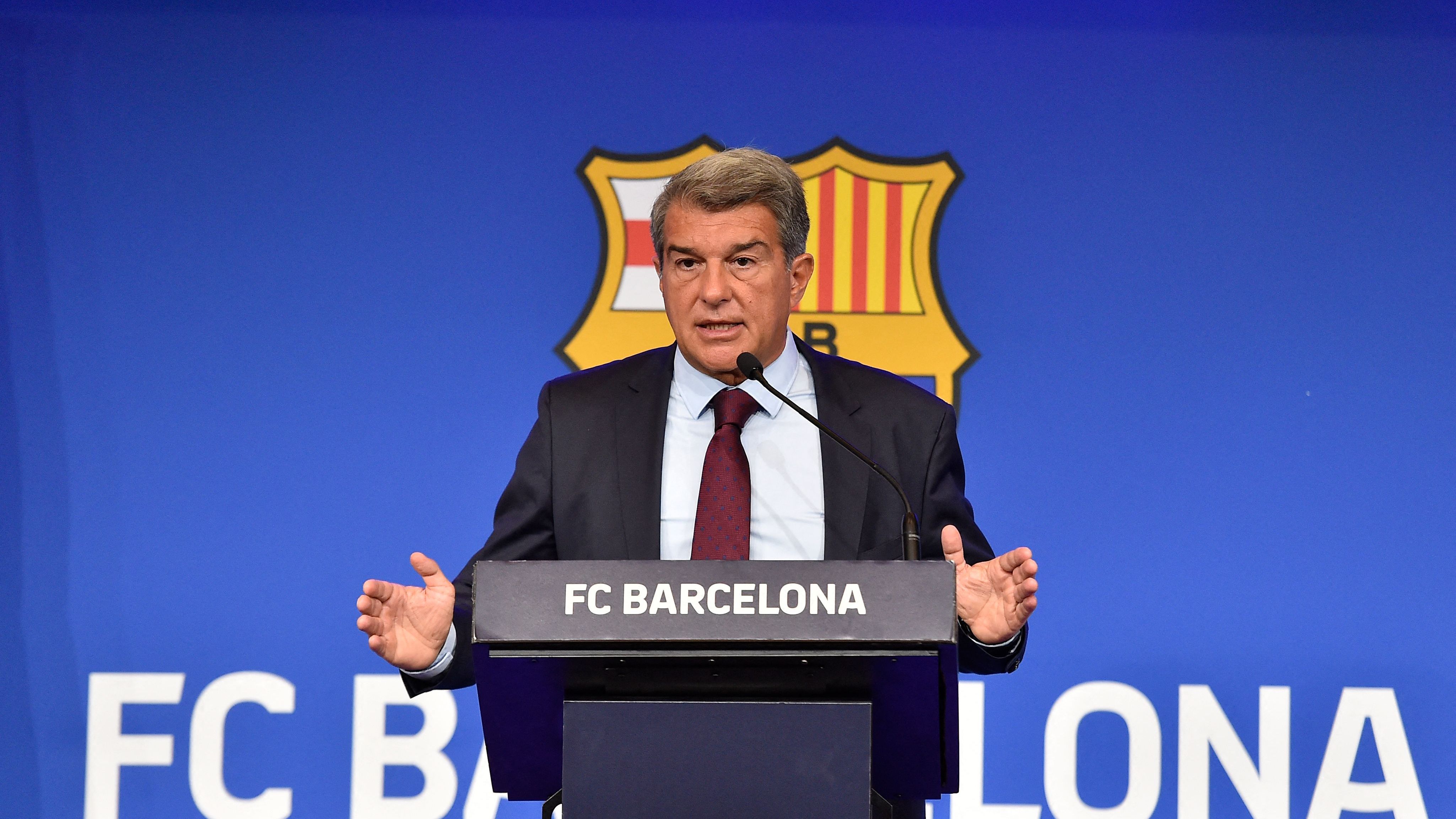


How Barcelona Dodged a Champions League Crisis Amid Financial Turmoil
Delve into the gripping tale of Barcelona‘s near-exclusion from the Champions League due to mounting financial issues, as shared by club president Joan Laporta. This revelation highlights the Catalan club’s ongoing struggles with regulatory compliance and the innovative steps taken to safeguard their European dreams.
Barcelona’s Tense Negotiations Over Financial Violations
Laporta, the Barcelona leader, openly shared how the club teetered on the edge of a Champions League prohibition stemming from economic missteps. For the second year running, the team breached UEFA’s Financial Fair Play guidelines, culminating in a €15 million fine after their initial infringement in 2024.
The Inherited Debt and Critical Interventions
Laporta confessed that the looming suspension compelled his team to engage in rigorous discussions with UEFA to sidestep severe penalties. Upon taking charge, they stepped into a club plagued by substantial debts from the prior administration led by Josep Maria Bartomeu, alongside rigorous La Liga mandates. Deploying financial tools that caught UEFA’s eye proved essential in steering through this unstable terrain.
Direct Talks to Avert a Ban
At the General Assembly, Laporta explained how employing various financial mechanisms nearly resulted in a full-year exclusion from the Champions League. He personally intervened in negotiations with UEFA to block this sports-related penalty, stressing that these measures were vital for managing the inherited fiscal woes.
Laporta’s Defense of Financial Strategies
“UEFA aimed to bar us from the upcoming Champions League participation,” Laporta stated. “We argued that Barcelona operates as a members’ club without the ability to expand capital, which helped reduce the fine for financial fair play violations from 60 million to 15 million euros. Still, they pushed for exclusion from the next tournament.”
Laporta justified these economic tactics, noting they were crafted to halt a significant departure of club members and restore financial stability.
“These strategies were meant to curb a massive member exodus and ease the burdens we faced over four years ago,” he noted. “In essence, these aren’t capital boosts; they’re temporary asset transfers that get reclaimed later.”
He elaborated: “In return, we gain immediate funds. For instance, we sold 25% of our TV rights to an investment fund, yielding €600 million. Though this equates to about €35 million annually, it’ll revert to the club in 25 years. It’s a short-term asset shift that ultimately rescued our organization.”
Balancing Compliance and Club Survival
This approach underscores the delicate equilibrium Barcelona maintained between adhering to rules and addressing urgent needs. Through strategic foresight, the club evaded UEFA’s harshest measures, keeping their roster qualified for Europe’s top tournament despite heavy economic pressures.
Exploring New Revenue Streams with International Matches
The 63-year-old executive also touched on the forthcoming La Liga encounter with Villarreal set in the United States. Though not fully on board with relocating matches overseas, he underscored the economic gains involved.
“We’re not thrilled about sending our squad abroad, but as former president Gaspart pointed out, it’s essential for securing unconventional earnings,” he remarked. “Boosting our presence in key markets has attracted additional sponsors. We’ll leverage this to grow our footprint in the US, a burgeoning market hosting the upcoming World Cup, as brand expansion draws in more backers.”
“Coaches like Deco and Flick prioritize player fitness, yet they travel to places like Saudi Arabia for the Spanish Super Cup to generate revenue that wouldn’t exist otherwise. The same applies to Miami. Ultimately, La Liga and all teams gain from this extra income, with Barcelona and Villarreal reaping the most direct benefits.”
Shifting Focus Back to the Field and Future Stability
Having overcome the Champions League threat, Barcelona can now concentrate on their on-field efforts. After securing a 2-1 win against Girona, they trail league frontrunners Real Madrid by just two points. Upcoming fixtures include a Champions League showdown with Olympiacos and the intense El Clasico rivalry.
Building a Sustainable Financial Framework
Under Laporta’s guidance, the club’s financial plan seeks to maintain an equal balance of income and outgoings while developing a long-term approach for squad investments and salaries. Tactically, ensuring team strength must align with financial fair play standards to prevent past errors from jeopardizing European involvement.
Demonstrating Resilience and Forward-Thinking
Barcelona’s adept handling of UEFA’s penalties showcases their adaptability and evolving professionalism, merging fiscal caution with competitive drive as they pursue victories at home and abroad.
Barcelona’s Financial Struggles and Their Impact on European Competitions
Understanding the Financial Fair Play Regulations
Financial Fair Play (FFP) rules, enforced by UEFA, have been a major hurdle for clubs like Barcelona, putting a spotlight on how teams manage their budgets in the world of soccer. These regulations require clubs to balance their books, ensuring that spending on players, wages, and transfers doesn’t exceed their revenue. For Barcelona, this has meant navigating strict limits that could potentially sideline them from prestigious tournaments like the UEFA Champions League.
In recent years, Barcelona’s financial challenges have stemmed from aggressive spending on star players, which inflated their wage bill and transfer fees. For instance, high-profile signings like those in the late 2010s pushed the club over the salary cap, leading to penalties from La Liga and UEFA. This isn’t just about one bad season; it’s a broader issue affecting many top clubs, but Barcelona’s situation has been particularly scrutinized due to their global fanbase and historical success.
What makes FFP so impactful is its focus on sustainability. Clubs must demonstrate they aren’t relying on owners’ injections of cash or unsustainable debt to compete. For Barcelona, this translated into restrictions on registering new players and, in extreme cases, threats to their Champions League participation. While the club hasn’t been fully excluded, the financial pressures have forced them to make tough decisions, like selling key assets to comply with these rules.
Joan Laporta’s Statements on the Financial Crisis
Barcelona President Joan Laporta has been vocal about the club’s financial woes, openly linking them to potential risks in European competitions. In various interviews and press conferences, Laporta has emphasized how FFP constraints are “strangling” clubs like Barcelona, making it harder to build competitive squads for the Champions League.
One of Laporta’s key points is the disparity between revenue generation and regulatory demands. He has highlighted that while Barcelona generates massive income from ticket sales, merchandise, and global branding, the pandemic exacerbated their cash flow issues. Laporta stated in 2021 that the club was “fighting to avoid exclusion-like scenarios” due to mounting debts, underscoring the real threat of financial sanctions that could limit their Champions League involvement.
This transparency from Laporta has helped fans understand the bigger picture. For example, he explained that without restructuring deals and cutting costs, Barcelona risked not meeting UEFA’s break-even requirements, which are crucial for Champions League qualification. His leadership style adds a human element, showing that even at the highest levels, financial challenges in soccer demand strategic overhaul.
The Root Causes of Barcelona’s Financial Woes
Digging deeper, Barcelona’s financial troubles can be traced back to several interconnected factors. Overspending on transfers stands out as a primary culprit. The club invested heavily in players like Neymar and Philippe Coutinho, deals that didn’t yield the expected returns and left a gaping hole in their finances.
- Excessive wage commitments: Top earners like Lionel Messi commanded salaries that strained the budget, especially after his departure in 2021, which was partly driven by financial necessity.
- Impact of the COVID-19 pandemic: Matchday revenues plummeted as stadiums emptied, worsening an already precarious situation and forcing Barcelona to defer payments and seek loans.
- Poor financial planning: Years of operating without a strict budget led to accumulated debt, with Laporta admitting that previous administrations overlooked long-term sustainability.
Additionally, the club’s Camp Nou stadium renovations have added to the financial burden, requiring upfront investments that clash with FFP limits. This cocktail of issues has made Barcelona a case study for how financial missteps can jeopardize a team’s Champions League dreams, affecting not just the club but also player morale and fan engagement.
Steps Barcelona Is Taking to Overcome Challenges
To address these hurdles, Barcelona has implemented a multi-faceted recovery plan under Laporta’s guidance. The focus is on rebuilding financial stability while maintaining competitiveness in the Champions League.
- Cost-cutting measures: The club has renegotiated contracts and reduced the wage bill, including salary deferrals for players, to free up cash for FFP compliance.
- Revenue-boosting initiatives: Expanding global partnerships, like new sponsorship deals with tech giants, aims to increase income streams and support future transfers.
- Strategic player sales: High-profile exits, such as those of Ousmane Dembélé and Frenkie de Jong, have been used to balance the books, though this comes at the cost of on-field strength.
- Long-term restructuring: Laporta has pushed for reforms in club governance, including better financial forecasting and investment in youth academies to reduce reliance on expensive signings.
These efforts highlight Barcelona’s commitment to turning things around, with experts noting that similar strategies could help other clubs facing UEFA scrutiny. By prioritizing financial health, Laporta is positioning Barcelona to not only avoid Champions League exclusion but also thrive in it once again.
The Role of Fans and Global Support in Recovery
Fans play a pivotal role in Barcelona’s financial recovery, as their loyalty drives ticket sales and merchandise revenue. Laporta has encouraged greater fan involvement, such as through membership drives, to bolster the club’s coffers. This community aspect makes Barcelona’s story relatable, showing how fan support can influence outcomes in high-stakes competitions like the Champions League.
In essence, the club’s journey through these challenges underscores the need for balanced financial practices in modern soccer. With Laporta at the helm, Barcelona is working towards a future where financial woes don’t dictate their European fate, ensuring they remain a force in the Champions League for years to come.









